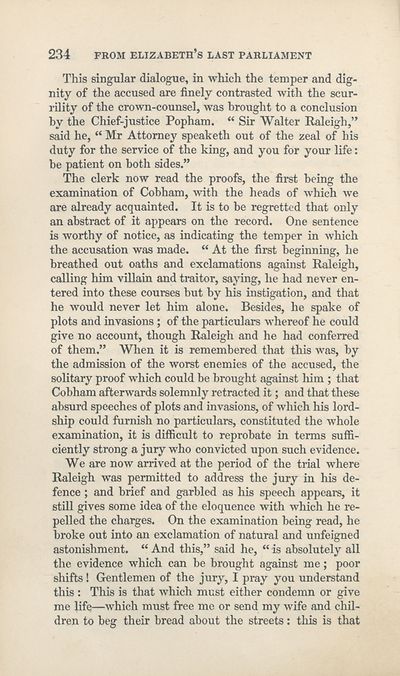Download files
Complete book:
Individual page:
Thumbnail gallery: Grid view | List view

234 from Elizabeth’s last parliament
This singular dialogue, in which the temper and dig¬
nity of the accused are finely contrasted with the scur¬
rility of the crown-counsel, was brought to a conclusion
by the Chief-justice Popham. “ Sir Walter Raleigh,”
said he, “ Mr Attorney speaketh out of the zeal of his
duty for the service of the king, and you for your life:
be patient on both sides.”
The clerk now read the proofs, the first being the
examination of Cohham, with the heads of which we
are already acquainted. It is to he regretted that only
an abstract of it appears on the record. One sentence
is worthy of notice, as indicating the temper in which
the accusation was made. “ At the first beginning, he
breathed out oaths and exclamations against Raleigh,
calling him villain and traitor, saying, he had never en¬
tered into these courses but by his instigation, and that
he would never let him alone. Besides, he spake of
plots and invasions ; of the particulars whereof he could
give no account, though Raleigh and he had conferred
of them.” When it is remembered that this was, by
the admission of the worst enemies of the accused, the
solitary proof which could be brought against him ; that
Cohham afterwards solemnly retracted it; and that these
absurd speeches of plots and invasions, of which his lord-
ship could furnish no particulars, constituted the whole
examination, it is difficult to reprobate in terms suffi¬
ciently strong a jury who convicted upon such evidence.
We are now arrived at the period of the trial where
Raleigh was permitted to address the jury in his de¬
fence ; and brief and garbled as his speech appears, it
still gives some idea of the eloquence with which he re¬
pelled the charges. On the examination being read, he
broke out into an exclamation of natural and unfeigned
astonishment. “ And this,” said he, “ is absolutely all
the evidence which can be brought against me; poor
shifts! Gentlemen of the jury, I pray you understand
this : This is that which must either condemn or give
me life—which must free me or send my wife and chil¬
dren to beg their bread about the streets: this is that
This singular dialogue, in which the temper and dig¬
nity of the accused are finely contrasted with the scur¬
rility of the crown-counsel, was brought to a conclusion
by the Chief-justice Popham. “ Sir Walter Raleigh,”
said he, “ Mr Attorney speaketh out of the zeal of his
duty for the service of the king, and you for your life:
be patient on both sides.”
The clerk now read the proofs, the first being the
examination of Cohham, with the heads of which we
are already acquainted. It is to he regretted that only
an abstract of it appears on the record. One sentence
is worthy of notice, as indicating the temper in which
the accusation was made. “ At the first beginning, he
breathed out oaths and exclamations against Raleigh,
calling him villain and traitor, saying, he had never en¬
tered into these courses but by his instigation, and that
he would never let him alone. Besides, he spake of
plots and invasions ; of the particulars whereof he could
give no account, though Raleigh and he had conferred
of them.” When it is remembered that this was, by
the admission of the worst enemies of the accused, the
solitary proof which could be brought against him ; that
Cohham afterwards solemnly retracted it; and that these
absurd speeches of plots and invasions, of which his lord-
ship could furnish no particulars, constituted the whole
examination, it is difficult to reprobate in terms suffi¬
ciently strong a jury who convicted upon such evidence.
We are now arrived at the period of the trial where
Raleigh was permitted to address the jury in his de¬
fence ; and brief and garbled as his speech appears, it
still gives some idea of the eloquence with which he re¬
pelled the charges. On the examination being read, he
broke out into an exclamation of natural and unfeigned
astonishment. “ And this,” said he, “ is absolutely all
the evidence which can be brought against me; poor
shifts! Gentlemen of the jury, I pray you understand
this : This is that which must either condemn or give
me life—which must free me or send my wife and chil¬
dren to beg their bread about the streets: this is that
Set display mode to:
![]() Universal Viewer |
Universal Viewer | ![]() Mirador |
Large image | Transcription
Mirador |
Large image | Transcription
| Antiquarian books of Scotland > Politics & government > Life of Sir Walter Raleigh > (240) |
|---|
| Permanent URL | https://digital.nls.uk/113655284 |
|---|
| Description | Thousands of printed books from the Antiquarian Books of Scotland collection which dates from 1641 to the 1980s. The collection consists of 14,800 books which were published in Scotland or have a Scottish connection, e.g. through the author, printer or owner. Subjects covered include sport, education, diseases, adventure, occupations, Jacobites, politics and religion. Among the 29 languages represented are English, Gaelic, Italian, French, Russian and Swedish. |
|---|

